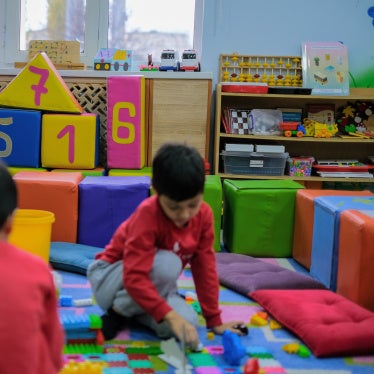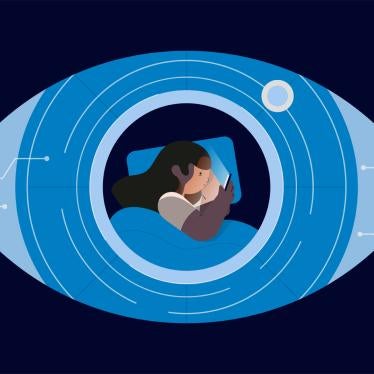Countless children around the world are routinely denied their basic human rights, Human Rights Watch charges in a report "PROMISES BROKEN:An Assessment of Children's Rights on the 10th Anniversary of the Convention on the Rights of the Child" marking the tenth anniversary of the adoption of the Convention on the Rights of the Child.
Despite nearly universal ratification of the Convention, millions of children receive no education, work long hours under hazardous conditions, or languish in inhumane conditions in institutions. Others endure harassment and physical abuse by police, are subject to trafficking and sexual exploitation, or are forced to become soldiers or refugees from armed conflict.
"The international community has failed its children," said Lois Whitman, executive director for the Children's Rights Division of Human Right Watch. "For too many children, the promises of the Convention remain hollow, and the abuses they endure every day contradict the commitments made by their governments."
Every recognized country of the world, except the United States and the collapsed state of Somalia, has ratified the Convention, making it the single most widely ratified treaty in existence. The Convention was adopted by the United Nations General Assembly on November 20, 1989, and is the focus of a special U.N. General Assembly session on November 11.
"The U.S. failure to ratify this convention is inexcusable," said Whitman. "What kind of message does this send? It undermines the U.S.'s credibility as a nation that cares about children."
The Human Rights Watch report, "Promises Broken," assesses the rights of children, drawing on research conducted in twenty-six countries over the past five years. The report surveys a broad range of children's rights, including:
- Child Soldiers: 300,000 children in more than thirty countries are participating in armed conflicts, serving on the front lines of combat, as spies, messengers, porters and human mine detectors, and subject to injury, disability, psychological trauma and death.
- Refugees: Children make up over half of the world's refugees. They are also subject to hazardous labor exploitation, physical abuse, denial of education, sexual violence and exploitation, cross-border attacks and recruitment as child soldiers.
- Police Abuse and Arbitrary Detention of Street Children: Street children throughout the world are subjected to routine harassment and physical abuse by police, government and private security forces, who seek to clean the streets of a perceived social blight. Street children face extortion, theft, severe beatings, mutilation, sexual abuse and even death.
- Children in Conflict with the Law: Children are often denied due process, are physically abused or tortured while in state custody, and subjected to appalling conditions of confinement. Six countries, including the United States, are known to have executed juvenile offenders during the past decade.
- Orphans and Abandoned Children: Hundreds of thousands, if not millions of children are kept in orphanages and non-penal institutions, after being orphaned or abandoned. In some cases, such children are deprived of adequate food and basic medical care, an adequate education, and subjected to appalling levels of cruelty and sometimes deadly neglect.
- Child Labor: 250 million children between the ages of 5 and 14 work in developing countries. Nearly half work full-time and have little or no access to education. Child laborers may be chained to carpet looms, work in the field sixteen hours a day, or be hidden away as domestic servants, earning little and often physically abused.
- Sexual Abuse and Trafficking: An unknown but very large number of children are used for commercial sexual purposes every year, often ending up victims of HIV/AIDS and other sexually transmitted diseases. Prostituted children can be raped, beaten, sodomized, emotionally abused, tortured, and even killed by pimps.
- Education: 130 million children in 1998 had no access to basic education, and millions of others received little or substandard instruction. In many countries, ethnic minorities and girls are denied an adequate education, and in poor or rural areas, prohibitive school fees may keep many children out of school.
Human Rights Watch challenged governments to improve the lives of children by fully implementing the Convention. It also urged steps to strengthen protections for children including the ratification of the new International Labor Organization (ILO) Convention on the Worst Forms of Child Labor, ratification of the Rome Statute of the International Criminal Court, and raising the minimum age for recruitment and participation in armed conflict from fifteen to eighteen.







